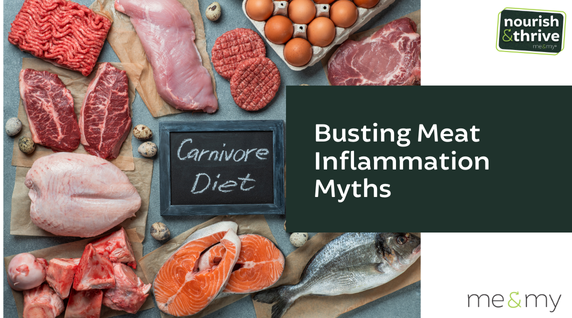Debunking Myths: The Carnivore Diet and Meat as Inflammatory Foods

In recent years, dietary trends and health advice have seen significant shifts, with plant-based diets often being lauded as the ultimate path to wellness. However, the carnivore diet and the consumption of meat have frequently been labeled as inflammatory, leading to potential health concerns. But are these claims backed by scientific evidence, or are they merely misconceptions?
Watch the full video here:
The Carnivore Diet: A New Perspective
Recent studies have started to shed light on the potential benefits of the carnivore diet, particularly its anti-inflammatory properties. For example, a 2024 study published in Frontiers in Nutrition reported significant clinical improvements in patients with inflammatory bowel disease (IBD) who followed a carnivore diet. The participants experienced remarkable reductions in inflammation, challenging the notion that meat consumption inherently leads to inflammatory responses.
Understanding Meat-Based Toxins
While meat-based foods can contain natural toxins such as histamine, aflatoxins, and biogenic amines, proper handling, storage, and cooking can significantly reduce the risk of exposure. Moreover, the production of trimethylamine N-oxide (TMAO) by gut bacteria from dietary choline and carnitine, commonly found in red meat, has been associated with certain health risks. However, these potential risks must be weighed against the benefits of nutrient-rich meat sources.
Plant-Based Toxins: A Hidden Threat?
Contrary to the widely held belief that plant-based diets are inherently healthier, many plant-based foods contain natural toxins and antinutrients. For instance, lectins in legumes, oxalates in spinach and beet greens, and phytates in grains and seeds can interfere with nutrient absorption and cause digestive issues. Additionally, glucosinolates in cruciferous vegetables can affect thyroid function, and saponins in legumes and quinoa can disrupt digestive processes.
Balanced Perspective on Diet and Health
While both plant-based and meat-based diets have their pros and cons, it’s crucial to adopt a balanced perspective. The carnivore diet, when properly managed, can offer anti-inflammatory benefits and nutritional adequacy, as evidenced by recent scientific studies. Similarly, plant-based diets, with appropriate preparation methods, can minimize the impact of natural toxins and provide essential nutrients.
Conclusion:
In conclusion, the key to a healthy diet lies in understanding and mitigating the risks associated with both plant-based and meat-based foods. Rather than labeling one dietary approach as inherently superior or more harmful, it’s essential to consider individual health needs, preferences, and evidence-based practices for optimal wellness.
Whether you’re curious about trying the Carnivore Diet or looking to optimise your current approach, this meat-based lifestyle could be the key to unlocking your health goals.
Take the first step today and discover the difference a meat-based diet can make in your life!
Embrace a Holistic Approach with me&my wellness
At me&my wellness, we advocate for a holistic approach to health that harmonises mind, body, and spirit. Our holistic health coaching aims to address challenges, promoting healing on emotional and physical levels. We provide personalised strategies such as stress management, emotional healing, and guidance in balanced nutrition and lifestyle adjustments.
By focusing on a comprehensive approach, we empower you to reclaim your health and well-being. Ready to transform your wellness journey? Book a 15-minute FREE consultation with us today and take the first step towards a healthier, more balanced life.

